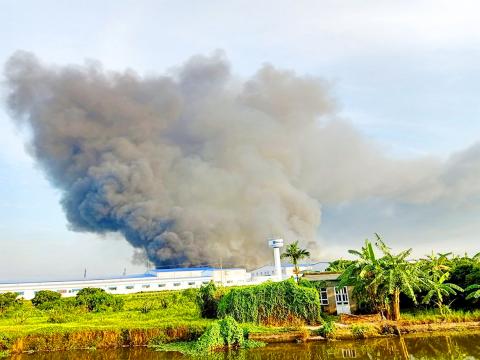Makalot Industrial Co Ltd (聚陽實業) yesterday said it would maintain its output from Vietnam by relocating workers, equipment and raw materials, after a fire broke out at two of the apparel maker’s plants in northern Vietnam early on Sunday.
“None of our workers were hurt and we are still evaluating the financial losses,” Makalot spokesperson Lin Heng-yu (林恆宇) said by telephone.
“Some orders for this month would be delayed to next month, but revenue for this year is not expected to be affected much,” he said.

Photo: CNA
The company said it has fire insurance for equipment and inventories at its Vietnamese plants.
Once it calculates its losses from the fire, it would file a claim with its insurers, Makalot said in a filing with the Taiwan Stock Exchange.
The blaze erupted at 4:45am in the workshop in the Thanh Ha commune of Hai Duong Province’s Thanh Ha District, and quickly spread due to flammable objects and the hot and dry weather, the Vietnam News Agency (VNA) reported on Sunday, citing the Hai Duong Police Department for Fire and Rescue.
The fire was put out in a few hours, but sewing machines and raw materials in the two plants were damaged, VNA reported.
The cause of the fire is under investigation, it said.
“The fire damaged our equipment and inventory, so we plan to redeploy about 1,000 employees and backup equipment to two nearby plants, once our clients agree,” Lin said.
Makalot has six plants in Vietnam.
“Raw material inventories have dropped to one week, but we have already placed new orders,” Lin said.
The two factories, which mainly produce low-end apparel for the US market, accounted for about 5 percent of the company’s annual output, or less than 750,000 dozens per year, Lin said.
The company does not expect orders for the second half of the year to be affected, he said.
“This is the high season for autumn and winter apparel, so none of our clients have wanted to withdraw orders,” Lin said.
The company will redo some of its orders through additional shifts at its four other plants, and outsource some orders, he said.
The two plants would be renovated within three months at the earliest, Lin said, without providing a time frame for the resumption of work.
Makalot shares yesterday closed down 0.53 percent at NT$196 in Taipei trading, compared with the broader market’s 0.66 percent rise.

PERSISTENT RUMORS: Nvidia’s CEO said the firm is not in talks to sell AI chips to China, but he would welcome a change in US policy barring the activity Nvidia Corp CEO Jensen Huang (黃仁勳) said his company is not in discussions to sell its Blackwell artificial intelligence (AI) chips to Chinese firms, waving off speculation it is trying to engineer a return to the world’s largest semiconductor market. Huang, who arrived in Taiwan yesterday ahead of meetings with longtime partner Taiwan Semiconductor Manufacturing Co (TSMC, 台積電), took the opportunity to clarify recent comments about the US-China AI race. The Nvidia head caused a stir in an interview this week with the Financial Times, in which he was quoted as saying “China will win” the AI race. Huang yesterday said

Nissan Motor Co has agreed to sell its global headquarters in Yokohama for ¥97 billion (US$630 million) to a group sponsored by Taiwanese autoparts maker Minth Group (敏實集團), as the struggling automaker seeks to shore up its financial position. The acquisition is led by a special purchase company managed by KJR Management Ltd, a Japanese real-estate unit of private equity giant KKR & Co, people familiar with the matter said. KJR said it would act as asset manager together with Mizuho Real Estate Management Co. Nissan is undergoing a broad cost-cutting campaign by eliminating jobs and shuttering plants as it grapples

The Chinese government has issued guidance requiring new data center projects that have received any state funds to only use domestically made artificial intelligence (AI) chips, two sources familiar with the matter told Reuters. In recent weeks, Chinese regulatory authorities have ordered such data centers that are less than 30 percent complete to remove all installed foreign chips, or cancel plans to purchase them, while projects in a more advanced stage would be decided on a case-by-case basis, the sources said. The move could represent one of China’s most aggressive steps yet to eliminate foreign technology from its critical infrastructure amid a

MORE WEIGHT: The national weighting was raised in one index while holding steady in two others, while several companies rose or fell in prominence MSCI Inc, a global index provider, has raised Taiwan’s weighting in one of its major indices and left the country’s weighting unchanged in two other indices after a regular index review. In a statement released on Thursday, MSCI said it has upgraded Taiwan’s weighting in the MSCI All-Country World Index by 0.02 percentage points to 2.25 percent, while maintaining the weighting in the MSCI Emerging Markets Index, the most closely watched by foreign institutional investors, at 20.46 percent. Additionally, the index provider has left Taiwan’s weighting in the MSCI All-Country Asia ex-Japan Index unchanged at 23.15 percent. The latest index adjustments are to